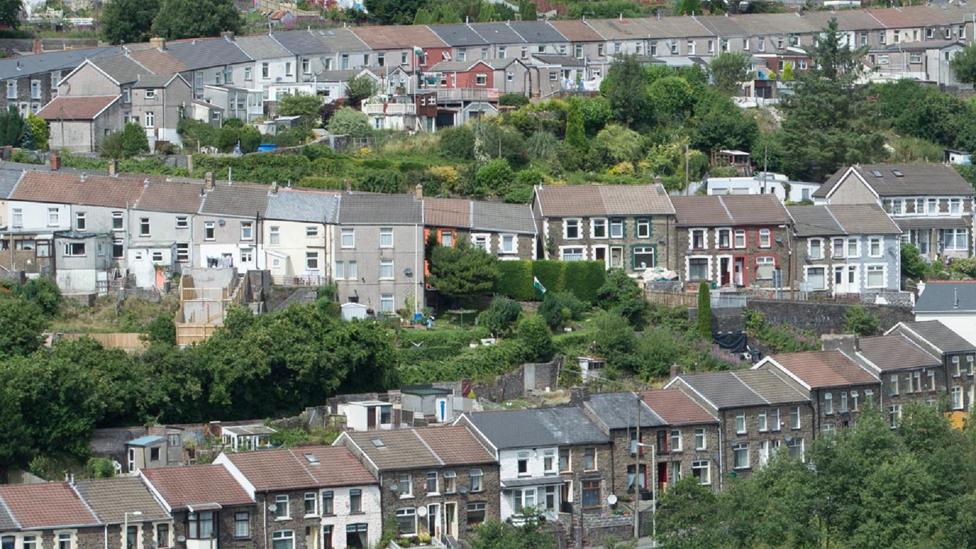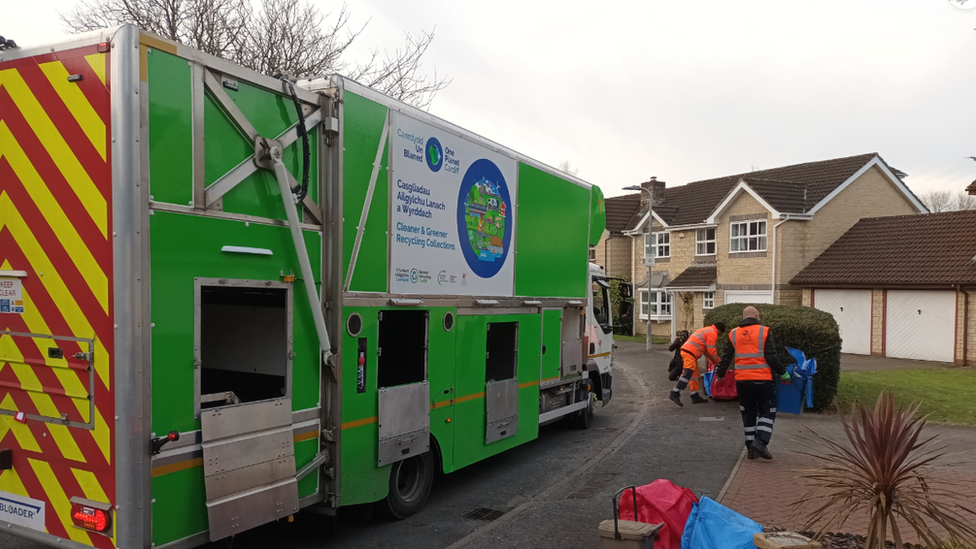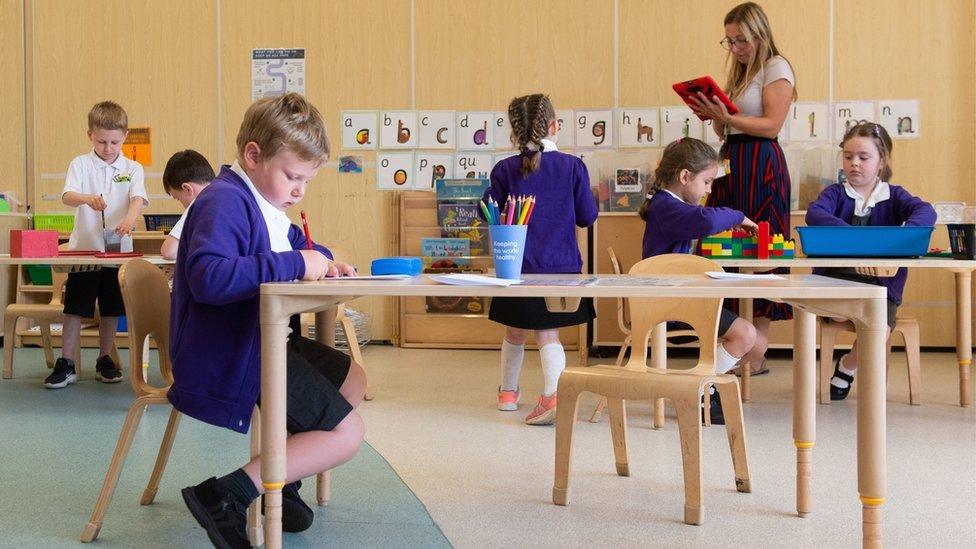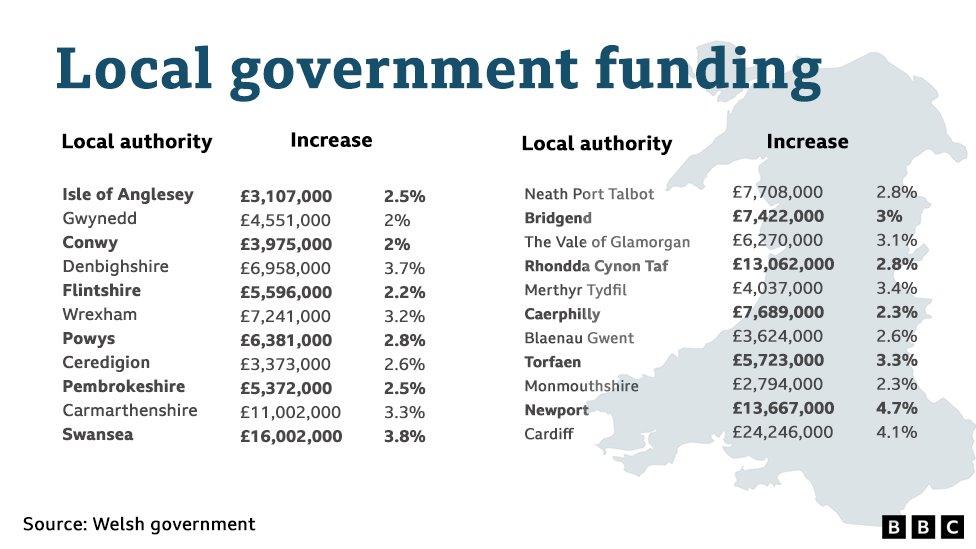Council taxes to rise in Wales despite funding boost
- Published
- comments

Communities across Wales are likely to see council tax hikes, the Welsh Local Government Association has warned
Cuts are set to be made across Wales, despite council tax rises as high as 10% and an increased budget, leaders have warned.
Local authorities are among the few public sector bodies getting more money in next year's budget.
But Wales' finance minister Rebecca Evans said councils still had "difficult decisions" to make.
Newport council will see the largest budget increase at 4.7%, while Conwy and Gwynedd will get the worst at 2%.
The Welsh Conservatives accused the Welsh government of giving north Wales "a rough deal", while Plaid Cymru said councils were being asked to do more with less.
Overall, local authority funding will rise by 3.1% to £5.5bn, but what each council gets varies.
Council leaders said cuts to other grants and commitments made by the Welsh government to boost teachers' pay left them with gaps to fill.
Andrew Morgan, leader of the the Welsh Local Government Association (WLGA), welcomed the increase but said it would not protect services.
The Welsh government has urged local authorities to keep any council tax rises at a "reasonable level", saying it would use its powers to cap council tax if needed.
No council tax rates were set on Wednesday and councils will make decisions about what to do over the next few months.
Councils have been one of the few beneficiaries of the 2024-25 budget as ministers sought to prioritise frontline services including the NHS.
Practically everything else faces cuts in real terms at least - with the Welsh government saying funding they get from Westminster was not meeting the pressure of inflation.
Local authorities provide many of the public services people rely on - including schools, bin collections and social care.
Council tax makes up 20-25% of their funding and shortfalls in can mean local authorities look at whether they should rise the tax they charge.

Councils fund rubbish collections, among other services
What are Welsh councils getting?
The uplift of 3.1% was what councils were expecting, but they had already warned it could lead to cuts to services, job losses and increases in council tax.
According to Tuesday's announcement, Newport will receive the largest percentage increase at 4.7%, Cardiff second with 4.1% and Swansea third at 3.8%.
Conwy and Gwynedd will get the smallest increases at 2% each, followed by Caerphilly and Monmouthshire at 2.3%.
Silvana Price, in Swansea, believed councils had "lots of money" but were not focussing on what people need.
"We don't need all these arts and things if we're all starving... we don't need all these fancy things. Let's just have our NHS and everything that goes with it," she said.

Zoe Ross thinks councils need to be more transparent with their money
Zoe Ross, who works on a market stall in Swansea, said councils needed to be more transparent in what they spend.
"We need more auditing in local councils because they get given a lot of money and not an awful lot of the public know what they do with it," she said.
Ms Evans said: "I appreciate the pressures local government is facing and recognise that demand for services, along with the recent very high rates of inflation, mean local government will still need to make difficult decisions on services, efficiencies, and council tax in setting their budgets."
Mr Morgan, who is also leader of Rhondda Cynon Taf council, said ahead of the announcement that council tax increases would likely range between 5% and 10% across Wales' 22 local authorities.
To avoid cuts to services councils would have to implement tax rises of 30-40%, which would be "simply unaffordable for residents," he said.
Llinos Medi, Plaid Cymru's WLGA group leader and leader of Anglesey council, said there was no extra money to cover planned increase in teachers' pay, "which means that councils will be expected to meet the cost of a Welsh government spending commitment".
Mark Pritchard, the independent WLGA group leader and leader of Wrexham, said cuts to grants meant "councils will receive far less than the suggested increase".

A council leader said local authorities will have to find money for increased teachers' pay from their own budgets
Welsh Conservative Darren Millar called for an "independent review" of the council funding formula, saying: "The Labour government has, yet again, given north Wales a rough deal with lower council funding settlements than local authorities in south Wales."
Officials said there was no evidence that any authority with particular geographical or social characteristics was disadvantaged by the funding formula, which they said was based on relative need.
At a Senedd committee on Wednesday, Ms Evans said a funding floor was implemented to stop Gwynedd and Conwy from receiving less than 2%.
She said they would have otherwise received less through the formula the government used.
Before the funding announcement was confirmed Dyfrig Siencyn, Gwynedd's council leader, said residents in his area were looking at a rise of 9%, subject to agreement.
The Plaid Cymru councillor said: "If we don't increase it to that level then something has to go from the services point of view."
He said school budgets were being cut, the level of care services was also in question and no services could be guaranteed anymore.
Last year school budgets were cut by 2%, Mr Siencyn said - this year they will be cut by a further 1%.
He said the local authority was already "struggling to provide the services that we would wish to provide them now".
"The big fear is that somebody's life will be affected, somebody might die," he added.
"A child might not get the care he needs because we haven't got the resources to provide the backing that they need," he added.
"We will do everything that we can to protect those services, but that means that we have to take from somewhere else."

Gwynedd's council leader Dyfrig Siencyn thinks the budget will mean some local authorities will become bankrupt in the near future
In recent months, some senior councillors in Wales have warned it is only a matter of time before a local authority goes bankrupt.
Mr Siencyn believes Tuesday's budget had made this more likely, leaving councils having to make cuts he would deem "unacceptable".
Andrew Morgan said while councils could reach bankruptcy "if we continue to see pressure on budgets", he was hopeful "that next year that won't be the year it happens".
Ms Evans said she would be "unlikely" to use powers to cap any council tax rises, but urged restraint.
But she added: "We've been really clear that the Welsh government can use its powers to cap council tax if it sees a palpably excessive approach from a local authority," she said.

Plaid Cymru Senedd finance spokesman Peredur Owen Griffiths said: "Due to the ineptitude and callousness of the Tories in Westminster - which has been compounded by the financial mismanagement of the Labour government in Wales - councils are being asked to do more with less."
A Welsh government spokesperson said: "The funding formula is agreed by a technical group including members of local government from across Wales and independent members to ensure its decisions are impartial and fair."
"Distribution is based on relative need (calculated using local authorities' demographic, physical, economic and social characteristics), rather than the complex system of retained business rates and different incentives which has characterised the approach in England."

KEEPING IT UP: The big story of the little blue pill
IT'S MY SHOUT: Short films made by up-and-coming Welsh film-makers

- Published19 December 2023

- Published17 October 2023

- Published12 May 2023